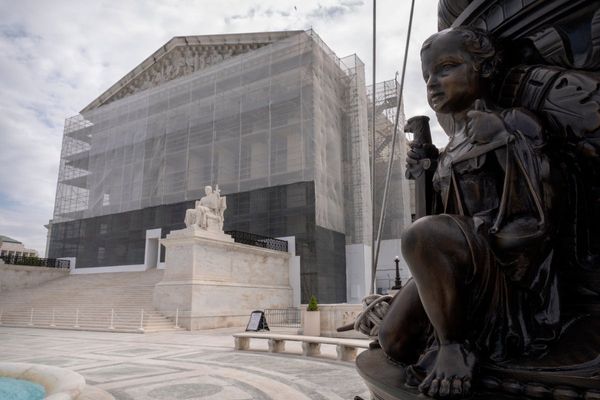
India claimed to have thwarted retaliatory missile and drone strikes launched by Pakistan on Thursday evening, which attempted to hit sites in Indian-administered Kashmir, Punjab and Rajasthan.
Residents in Jammu, in Indian-controlled Kashmir, reported missiles and drones over the city and the noise of explosions, amid a city-wide blackout.
The Indian army said its air defence systems had intercepted eight missiles fired by Pakistan that had attempted to target military stations in Jammu and the wider Indian-administered Kashmir region.
According to India, there were also attempts by Pakistan to target its Pathankot airbase in Punjab, which is less than 20 miles from the volatile shared border, and it came under heavy artillery fire from Pakistan forces. Locals living in the border cities of Jaisalmer and Bikaner also reported missiles flying overhead and the sound of shelling.
A statement by the Indian army said it had “neutralised” all the threats from Pakistan with missiles and drones. “No losses,” it said.
Thursday night’s attacks by Pakistan marked another escalation of the conflict between the two nuclear-armed countries, after Indian missile strikes on Pakistan in the early hours of Wednesday killed 31 people. Pakistan’s prime minister, Shehbaz Sharif, called India’s attacks, the most extensive airstrike attack on Pakistan in decades, an “act of war”.
Earlier on Thursday, Pakistan had accused India of “yet another blatant military act of aggression” after it claimed at least 25 Indian drones had been sent deep into Pakistani territory on Wednesday night, killing two civilians and injuring four soldiers. Military and government figures made it clear that Pakistan saw the drone strikes as a further “provocation” and felt compelled to retaliate.
India’s foreign minister, Subrahmanyam Jaishankar, warned that India would respond to any retaliatory aggression by Pakistan. “If there are military attacks on us, there should be no doubt that it will be met with a very, very firm response,” he told a visiting foreign delegation.
India’s claims to have stopped all Pakistani missiles and drone attacks are likely to come as a major embarrassment to Pakistan’s military. There was no immediate official comment from the Pakistani military but state-run Pakistan Television denied reports of military strikes in Indian-controlled Kashmir, calling them “false, baseless, and fabricated”.
India’s initial strikes on Wednesday were a direct retaliation for an attack in Indian-administered Kashmir late last month, in which militants killed 25 Hindu tourists and a guide. India had accused Pakistan of direct involvement in the attacks, through Islamist militant organisations it has long been accused of backing.
India claimed Wednesday’s strikes targeted only “terrorist infrastructure” including training camps and homes belonging to well-known militant organisations that have been behind some of the worst terrorist attacks in India over the past two decades. It emphasised it had not hit any Pakistani military bases or equipment, and described the strikes as “measured, not escalatory, proportionate and responsible”.
However, Pakistan denied that any terrorist groups had been operating in the areas hit by Indian missiles, and said the strikes had targeted only civilians.
Throughout the day, the international community had made efforts to mediate between India and Pakistan and bring them back from the brink of all-out war. The US secretary of state, Marco Rubio, said he had spoken to Pakistan’s Sharif and India’s Jaishankar and urged “the need for immediate de-escalation”. The Iranian and Saudi foreign ministers flew into Delhi on Thursday.
The two sides spent the day firing off escalatory allegations at each other. After Pakistan said India had “lost the plot” by sending dozens of drones into Pakistan, India alleged Pakistan had unsuccessfully attempted to launch drones and missiles at 15 military targets in its north and west, including in the cities of Amritsar, Srinagar and Chandigarh. It said its air defence systems stopped all the attacks.
India’s defence ministry said it had “neutralised” the air defence system over the Pakistani city of Lahore and said: “Any attack on military targets in India will invite a suitable response.”
Pakistan denied the allegations it had launched any strikes into India early on Thursday, with a military spokesperson referring to them as “phantom strikes”. Speaking to the Guardian, a senior Pakistani security official was clear that action would soon be taken. “The offensive response will come now,” he said.
India’s border states of Rajasthan and Punjab were put on high alert for a reprisal attack by Pakistan, with all police leave cancelled and border security forces given shoot-on-sight orders for any suspicious activities.
In Punjab, the Gurdaspur area was put under a complete blackout order on Thursday night while, in Rajasthan, schools near the border were shut, mock drills were conducted and evacuation plans were prepared. India said it had activated anti-drone systems near the border.
Across both countries, flights were suspended and airports shut down. In Pakistan, all flights from Karachi, Lahore and Sialkot airports were suspended. More than 20 local airports across the north of India were closed until Saturday.
In Pakistan’s Sindh region, which shares a border with India, a state of emergency was declared in all hospitals and health facilities, and all medical personnel and support staff leave was cancelled, according to a notice issued by the provincial health department.
Tens of thousands of people living along the disputed border that divides the region of Kashmir continued to flee, as cross-border firing continued between India and Pakistan troops, leaving homes destroyed and civilians dead.
Talib Hussain returned to his village of Salamabad, in Indian-administered Kashmir, on Thursday morning to find smoke still rising from the ruins of his two-storey house, destroyed by an artillery shell. His home was among several others levelled in the cross-border shelling between Indian and Pakistani troops in recent days.
“I’ve lost everything,” Hussain said, staring at the devastation. “Nothing remains of my house. We live in constant fear of the next attack. We are completely helpless, with only God’s mercy to protect us.”







